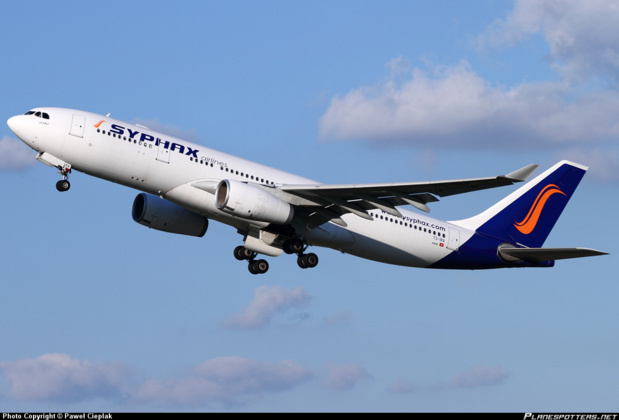
It is unlikely that the Airbuses of Syphax Airlines will grace the Tunisian sky once again. ©Paweł Cieplak
“Not respond to critics when our head is under water.”
This is what Mohamed Frikha declared, the founder of Syphax Airlines, during an interview early 2014, that can be found on the company’s website.
A philosophy in which the businessman, Deputy of Ennahdha, believes strongly even if it takes repeating lie after lie.
Because in spite of the never-ending list of creditors and the disastrous economic situation in Tunisia, Mohamed Frikha assures that he’ll resume his flights by October 17th.
Such confidence, that some don’t feign from declaring as arrogance, actually masks a headlong financial rush.
This is what Mohamed Frikha declared, the founder of Syphax Airlines, during an interview early 2014, that can be found on the company’s website.
A philosophy in which the businessman, Deputy of Ennahdha, believes strongly even if it takes repeating lie after lie.
Because in spite of the never-ending list of creditors and the disastrous economic situation in Tunisia, Mohamed Frikha assures that he’ll resume his flights by October 17th.
Such confidence, that some don’t feign from declaring as arrogance, actually masks a headlong financial rush.
Recurrent and multiple unpaid bills
Autres articles
According to various sources, the company would have a debt amounting to 230 million Dinars (104.8 million euros.)
It hasn’t paid for fuel in several months and would be owing between 17 and 23 million Dinars to the fuel provider AGIL, who filed a complaint last June.
It is also indebted of 2 million euros to the Paris Airports group.
Other sources state that it failed to pay a bill of 10 million Dinars (€4.5 million) to the Office of Civil Aviation and Airports (OACA.)
A figure that nobody wished to confirm in the company that is clearly very disorganized from the arrival of a new CEO, Khaled Chelly, a former employee of Tunisair.
In fact, Tunisair would also be on the list of creditors. Just like the Iranian company Naft Airlines that demands 1.2 million euros along with Libyan airline company claiming 2.2 million dollars.
As for the 160 employees of Syphax, they have been waiting to receive their pay for three months now.
As for passengers, it is still too early to assess the degree of this injury. The SNAV engaged in a safeguard procedure right after the cancelation of the BSP.
Some desperate clients were looking directly at the IATA in the hope of being reimbursed more rapidly.
In Tunisia, the President of the Tunisian Federation of Travel Agencies (FTAV), Mohamed Ali Toumi, declared to the newspaper African Manager that no agency had been refunded and should file a complaint to retrieve around 320,000 Dinars.
Yet Mohamed Frikha reaffirms in interviews that all passengers will be compensated as soon as business resumes.
It hasn’t paid for fuel in several months and would be owing between 17 and 23 million Dinars to the fuel provider AGIL, who filed a complaint last June.
It is also indebted of 2 million euros to the Paris Airports group.
Other sources state that it failed to pay a bill of 10 million Dinars (€4.5 million) to the Office of Civil Aviation and Airports (OACA.)
A figure that nobody wished to confirm in the company that is clearly very disorganized from the arrival of a new CEO, Khaled Chelly, a former employee of Tunisair.
In fact, Tunisair would also be on the list of creditors. Just like the Iranian company Naft Airlines that demands 1.2 million euros along with Libyan airline company claiming 2.2 million dollars.
As for the 160 employees of Syphax, they have been waiting to receive their pay for three months now.
As for passengers, it is still too early to assess the degree of this injury. The SNAV engaged in a safeguard procedure right after the cancelation of the BSP.
Some desperate clients were looking directly at the IATA in the hope of being reimbursed more rapidly.
In Tunisia, the President of the Tunisian Federation of Travel Agencies (FTAV), Mohamed Ali Toumi, declared to the newspaper African Manager that no agency had been refunded and should file a complaint to retrieve around 320,000 Dinars.
Yet Mohamed Frikha reaffirms in interviews that all passengers will be compensated as soon as business resumes.
What project is in store for the company’s survival?
A recovery that seems quite threatened after the loss of its flying authorization along with the insurance for its two Airbuses A319 last September 1st.
It has not paid the bill to a German charterer in the last 4 months, who owns two Airbuses that are parked in Sfax today.
“Since Syphax is under the regime of struggling companies, the judge believed that it would not be possible to repatriate the planes that are vital for the company's hope at starting up again,” states Ahmed Ben Salem, lawyer of the German charter company.
To be able to fly again, Mohamen Frikha has to present a solid recovery project as well as the means to pay his creditors as fast as possible.
In a rather enlightening interview he gave to the website leaders.com.tn, on Friday September 4th, he ensures to be working on the elaboration of this plan with the help of the Audit Firm KPMG.
In this way, he hopes to reschedule his debts and why not transform them into…shares!
Globally, he hopes to re-inject 20 million dinars (€9 million) to relaunch the company, thanks to bank loans and the return on deposits paid by some providers.
It has not paid the bill to a German charterer in the last 4 months, who owns two Airbuses that are parked in Sfax today.
“Since Syphax is under the regime of struggling companies, the judge believed that it would not be possible to repatriate the planes that are vital for the company's hope at starting up again,” states Ahmed Ben Salem, lawyer of the German charter company.
To be able to fly again, Mohamen Frikha has to present a solid recovery project as well as the means to pay his creditors as fast as possible.
In a rather enlightening interview he gave to the website leaders.com.tn, on Friday September 4th, he ensures to be working on the elaboration of this plan with the help of the Audit Firm KPMG.
In this way, he hopes to reschedule his debts and why not transform them into…shares!
Globally, he hopes to re-inject 20 million dinars (€9 million) to relaunch the company, thanks to bank loans and the return on deposits paid by some providers.
Suspicion of wrongdoings in initial public offering
A completely crazy proposition that perfectly illustrates the businessman’s personality.
Because throughout this crisis, Mohamed Frikha has always refused to do some self-introspection, preferring to accuse Tunisair of unfair competition. He also incriminates the political situation in his country following the attacks in the Bardo Museum and in Sousse.
Bad memory or bad faith? Syphax’s stock market value was suspended last January, meaning many months before the deadly attacks that wiped out any hope of recovery for the destination.
Some are still wondering how the company managed to obtain its flight certificate and an initial public offering.
The person accountable is non other than Salem Miladi, who was the Minister of Transportation at the time, and then became the Executive Director of Syphax…
For the lawyer Slaheddine Caïed Essebssi, who represents many creditors, this is one of the biggest fraud case since the fall of Ben Ali.
“I will strive to lift the parliamentary immunity of Mohamed Frikha to translate it into justice and attempt to retrieve the money of my clients and small shareholders,” he assures.
Thus, he hopes to discover where the company’s money went, meaning amounts of 110 million Dinars in revenues in 2013 and 130 million Dinars in 2014.
On his part, Mohamed Frika asserts being moneyless after having personally injected 60 million Dinars (€27.34 million) into the company.
Maybe the ripped off passengers could make contributions to refill the deputy’s accounts?
Because throughout this crisis, Mohamed Frikha has always refused to do some self-introspection, preferring to accuse Tunisair of unfair competition. He also incriminates the political situation in his country following the attacks in the Bardo Museum and in Sousse.
Bad memory or bad faith? Syphax’s stock market value was suspended last January, meaning many months before the deadly attacks that wiped out any hope of recovery for the destination.
Some are still wondering how the company managed to obtain its flight certificate and an initial public offering.
The person accountable is non other than Salem Miladi, who was the Minister of Transportation at the time, and then became the Executive Director of Syphax…
For the lawyer Slaheddine Caïed Essebssi, who represents many creditors, this is one of the biggest fraud case since the fall of Ben Ali.
“I will strive to lift the parliamentary immunity of Mohamed Frikha to translate it into justice and attempt to retrieve the money of my clients and small shareholders,” he assures.
Thus, he hopes to discover where the company’s money went, meaning amounts of 110 million Dinars in revenues in 2013 and 130 million Dinars in 2014.
On his part, Mohamed Frika asserts being moneyless after having personally injected 60 million Dinars (€27.34 million) into the company.
Maybe the ripped off passengers could make contributions to refill the deputy’s accounts?






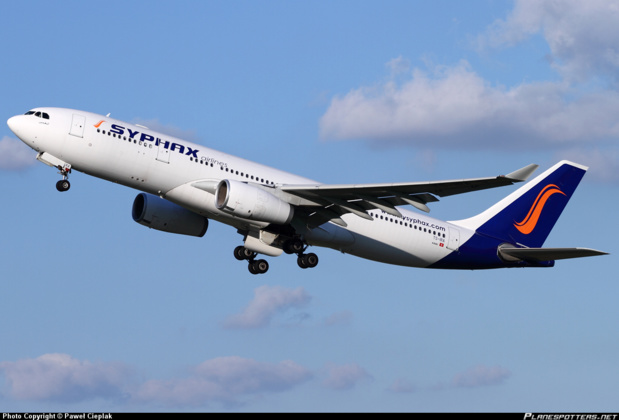









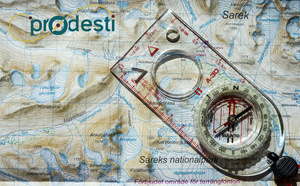






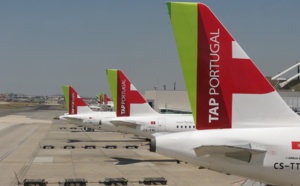
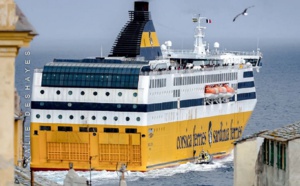

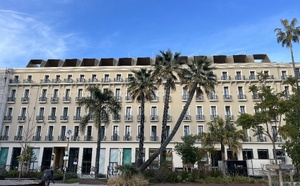

![Futuroscopie - Quand le sexual wellness renouvelle l'offre... [ABO] Futuroscopie - Quand le sexual wellness renouvelle l'offre... [ABO]](https://www.tourmag.com/photo/art/large_16_9/85728561-61073442.jpg?v=1737395082)















